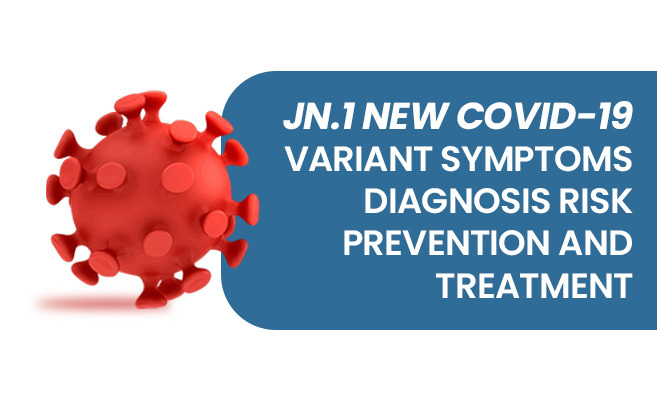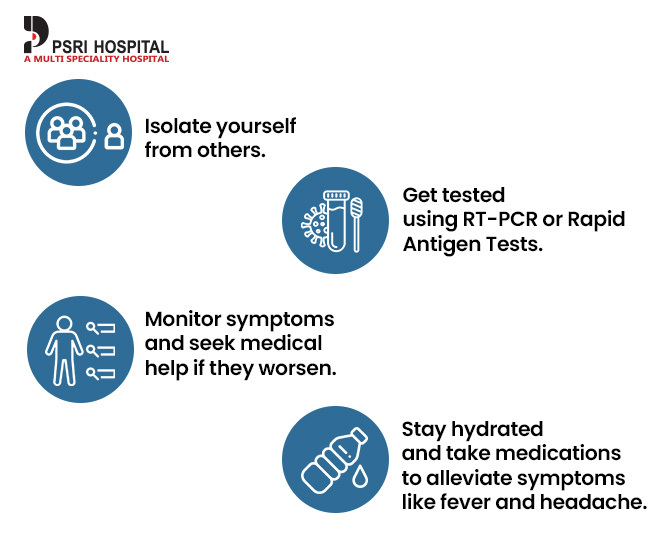JN.1 New COVID-19 Variant: Symptoms, Diagnosis, Risk, Prevention & Treatment

Last week, I came across a news article about the rapid spread of the new COVID-19 variant, JN.1, which immediately caught my attention. It made me think: How well do we understand these new variants of COVID-19? With the virus evolving so quickly, it’s important to grasp the differences between JN.1 and previous strains like Delta and BA.2 in order to manage our health and prevent further spread.
You have probably heard of variants like Omicron and Delta, but JN.1 raises new questions. How does it differ from earlier variants? And what should you do if you’ve come into contact with someone who might have the virus? Don’t worry, this post will break down the JN.1 New COVID-19 Variant symptoms, diagnostic process, risks, and preventive measures. By the end, you’ll have a clear understanding of how to protect yourself, from prevention to early diagnosis and treatment.
At PSRI Hospital, we are committed to providing the latest health information and offering advanced care to combat COVID-19 and its variants.
Let’s dive into everything you need to know about JN.1 to stay safe.
What Are the JN.1 New COVID-19 Variant Symptoms?

The JN.1 variant, similar to other COVID-19 variants, comes with a variety of symptoms. While many symptoms are similar to previous Omicron subvariants, JN.1 comes with its own set of characteristics that can help in identifying the infection.
- Common Symptoms of JN.1 are:
- Dry Cough: A persistent dry cough is a common symptom of the JN.1 New COVID-19 Variant.
- Fatigue: Many individuals experience extreme tiredness, even without strenuous physical activity.
- Sore Throat: A dry, scratchy feeling in the throat is reported by many who test positive for JN.1.
- Runny or Stuffy Nose: Nasal congestion often accompanies the variant.
- Muscle Aches: General muscle pain and discomfort, especially in the back and joints.
- Mild Fever: Mild fever or chills can be expected.
- Gastrointestinal Issues: Some individuals may experience nausea, vomiting, or diarrhea, which sets JN.1 apart from other variants like Delta.
- Loss of Taste or Smell: While not as prevalent, some still report losing their sense of taste or smell.
How to Identify and Diagnose the JN.1 New COVID-19 Variant?
Reliable testing methods are required to diagnose JN.1. While symptoms offer some insight, specific diagnostic tools are needed to make a definitive JN.1 New COVID-19 Variant diagnosis.
- RT-PCR Tests: This remains the reliable method for detecting JN.1 and any COVID-19 variant. RT-PCR tests are highly sensitive and accurate, offering clear results.
- Rapid Antigen Tests (RAT): These tests can provide quick results, though they are generally less accurate than RT-PCR. A negative RAT should be followed by a confirmatory RT-PCR test.
- Genomic Sequencing: This is essential to determine whether the infection is indeed from the JN1 New COVID-19 Variant. While not routinely performed for all cases, it helps identify new variants and assess their spread.
Since JN.1 shares symptoms with other respiratory illnesses like the flu or cold, advanced testing is important for an accurate diagnosis.
Risk Associated with the JN.1 Variant
The JN.1 variant has raised concerns due to its increased transmissibility and potential to evade immunity from past infections or vaccinations. However, the JN.1 New COVID-19 Variant risk generally causes mild illness in most cases.
- Transmission: Like the Omicron, JN.1 is highly contagious, meaning it can spread rapidly, especially in crowded or poorly ventilated areas. The variant’s ability to bypass some immune defenses makes it even more concerning for unvaccinated individuals.
- Severity: The severity of JN.1 is largely dependent on factors like age, existing health conditions, and vaccination status. While many experience only mild symptoms, those with underlying health conditions (e.g., diabetes, heart disease) or weakened immune systems are at risk of developing severe illness.
- High-Risk Groups:
- Older adults (60+ years)
- Immunocompromised individuals
- Pregnant women
- People with chronic diseases
For these groups, JN1 can lead to complications such as pneumonia, respiratory failure, and hospitalization. Therefore, it is crucial to monitor symptoms closely and seek medical help immediately if they worsen.
How to Prevent JN.1 Variant?
Preventing the JN.1 variant is similar to the measures taken for previous variants of COVID-19. However, as JN.1 has shown some ability to evade immunity, it’s essential to stay vigilant.
- Vaccination: Ensure you’re up-to-date with your COVID-19 vaccines, including booster shots. Even though JN.1 might evade some immunity, vaccines still reduce the risk of severe disease, hospitalization, and death.
- Wearing Masks: In high-risk areas or when around vulnerable individuals, wearing masks helps prevent the spread of the virus.
- Hand Hygiene: Wash your hands regularly with soap and water or use hand sanitizer, especially after touching surfaces in public places.
- Physical Distancing: Maintain at least 6 feet of distance from individuals showing symptoms of illness or when in crowded spaces.
- Avoiding Crowded Places: Limiting exposure to crowded areas can reduce the chances of contracting JN.1 or other variants.
JN.1 New COVID-19 Variant treatment
- For Mild Cases:
- At-home care includes adequate rest, hydration, and over-the-counter medications e.g., acetaminophen to alleviate symptoms like fever and headache. Monitoring symptoms is essential, and individuals should stay in isolation until symptoms subside and a negative test result is achieved.
- For Severe Cases:
- Hospitalization may be required for oxygen therapy, IV fluids, and antiviral treatments. Steroids may be prescribed for inflammation and managing severe symptoms.
- Special Treatments for High-Risk Individuals:
- In cases of severe illness, monoclonal antibody treatments and antiviral drugs may be used under medical supervision to reduce the severity of symptoms and the duration of illness.
At PSRI Hospital, we provide comprehensive JN.1 New COVID-19 Variant treatment services, including advanced testing and critical care options for patients with JN.1 or other variants. If you are feeling unwell or suspect you have been infected with the JN.1 variant, don’t hesitate to contact us for expert care.
Conclusion
The emergence of the JN.1 New COVID-19 Variant highlights the ongoing need for vigilance and preventive measures. While this variant may cause mild illness in most cases, it remains highly transmissible and could lead to severe complications for high-risk individuals. Keeping up with vaccination, adhering to safety measures, and seeking timely medical care are key to managing the spread and minimizing the impact of JN1.
If you need expert medical care, PSRI Hospital, the best hospital in New Delhi, is here to help you with the latest COVID-19 treatments, expert advice, and high-quality care.

 Book An Appointment
Book An Appointment Virtual Consultation
Virtual Consultation





